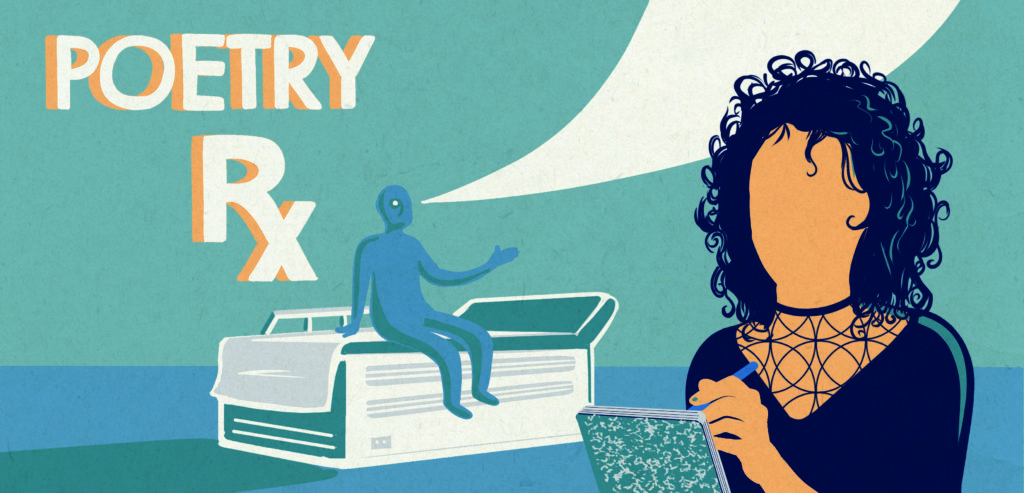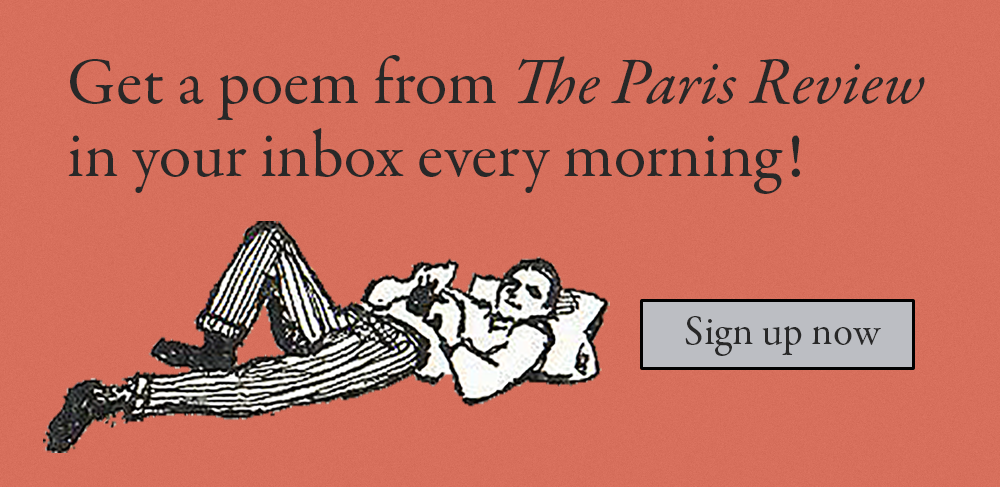In our column Poetry Rx, readers write in with a specific emotion, and our resident poets—Sarah Kay, Kaveh Akbar, and Claire Schwartz—take turns prescribing the perfect poems to match. This week, Claire Schwartz is on the line.
Dear Poets,
I recently realized I wanted to be a poet. Is there a poem for getting over the fear that my poetry won’t be good enough?
Sincerely,
A Hopeful Poet
Dear Hopeful Poet,
In a way, every poem answers you. Every poem moves against or in spite of the fear that language is not equal to the task. You call yourself both hopeful and afraid. Perhaps fear and hope are two names for the same destination: the first shaped by a mindfulness of loss and the second by an awareness of presence. Fear, like hope, knows that something that matters is at stake. Fear, then, is not something to “get over” but might, perhaps, be differently held so that it positions you to move toward your desire.
For you, Ilya Kaminsky’s “Author’s Prayer,” which moves headfirst into the realm of loss, naming it as the author’s site of making:
If I speak for the dead, I must leave
this animal of my body,I must write the same poem over and over,
for an empty page is the white flag of their surrender.
The impossible task—to “speak for the dead”—forms the condition of the author’s imperatives: “I must … I must … ” Halfway through the poem, the momentum from that original “if”—the energy of that conditional—shifts. The poem steadies. The speaker affirms: “Yes, I live.” Now the sincerity of obligation opens onto the exuberance of possibility: “I can cross the streets asking ‘What year is it?’ / I can dance in my sleep and laugh.” And then ability makes way for commitment, “can” moves to “will”:
I will praise your madness, and
in a language not mine, speakof music …
When the final line returns to the author’s obligation—“the darkest / days must I praise”—that obligation now carries the incontrovertible fact of the author’s living.
To be a poet means to serve the work; sometimes, the self gets in the way. If naming yourself poet amplifies the self in the form of self-doubt, let the title go. Move tenderly toward a single word. Then the next. You will come into the word poet in your own time. But if naming yourself poet gives you intention, offers you a map into the unknowable, say your name, Poet, softly to steady yourself. Doubt is where creativity resides. If you already knew the answer, you would not be making anything new. Yes, you live. Now what do you want to make with your living?
—CS
*
Dear Poets,
I’m a homosexual man living in a country where homosexuality is referred to mostly as an insult or in offensive jokes. I have loving friends to whom I’ve come out, and they have been extremely supportive. But somewhere, both within me and without, there’s this ineffable, permanent void of fear, self-doubt, self-reproach, and acute loneliness that at times seems to suck my very being inside of it. It leaves me in a hopeless pool of tears. I know that things will get better if I make the effort to find a romantic partner, but somehow I’m always already devoid of the strength and motivation to do so. Sometimes I feel this pain is self-inflicted. Do you have a poem that could be my companion in this distress?
Yours,
Gay and Despondent
Dear Gay and Despondent,
I hate that the free expression of love for you, and for so many, is disrupted. I hate how the violence of a closed-minded world can deform even our own relationship to our desire. I love that you’ve asked for a poem-as-companion to fortify you. I love how a poem can make room in my chest. It’s a private offering to how I would like to live. Poems can forge what June Jordan calls “living room,” an intimate space in which to be together, to envision and enact other ways to be.
I want to share with you a poem by Essex Hemphill, whose language made living room in a nation that sought, in many ways, to kill him. A black, gay man who died of AIDS-related complications, Hemphill was intimately familiar with the shapes of America’s hatred. For you, his “American Wedding,” which finds and forges possibilities in the interstices of violence:
No horsemen
bearing terror,
no soldiers of doom
will swoop in
and sweep us apart.
They’re too busy
looting the land
to watch us.
. . . . . . . . . . . . . .
They don’t know
we are becoming powerful.
Every time we kiss
we confirm the new world coming.
This is followed by the poem’s only stanza break, which underlines the magnitude of that statement and maps something haunted. Twenty-three years after Hemphill’s death, the new world he dreamed is still coming. Even as he imagined yet-to-arrive futures, Hemphill claimed the wide province of his love for his own present—not in the official language of the state’s flimsy promises but in the alternative ways of queer loving:
What the rose whispers
before blooming
I vow to you.
I give you my heart,
a safe house.
I give you promises other than
milk, honey, liberty.
. . . . . . . . . . . . . . . . . . . . . . . . . .
I assume you will always
be a free man with a dream.
The dream exists even absent recognition. Hemphill and so many other queer writers and makers—Melvin Dixon, Adrienne Rich, June Jordan, Joseph Beam, Audre Lorde, Marlon Riggs, Danez Smith—saw and see your desire. They know how beautiful your desire is. They join your company just as your letter joins Hemphill’s prayer:
Long may we live
to free this dream.
—CS
*
Dear Poets,
For a year now, I’ve been living alone, thousands of miles away from home for work and studies. Things are going well, and it looks as though I’ll be away even longer. I know I should be happy—these opportunities are what I came here for. And while I am, I also can’t grapple with the thought that there is literally no “going back.” Everything at home will keep moving without me. I don’t fully belong here and I feel like I no longer belong there, either. I’m having a hard time explaining this to anyone. Is there a poem that could help me cope with this feeling?
Yours,
Confused and In Between
*
Dear Confused and In Between,
When I read your letter, I thought immediately of these lines from Aracelis Girmay’s poem cycle “Elelegy”: “Distance: my wealth / Distance: my grief.” Distance carries many meanings. It makes sense that you feel conflicted. It’s okay to both name your grief and celebrate your possibilities. To identify one doesn’t erode the other. Trying to discipline feelings with “should” can be lonely-making. “Should” won’t change your feeling, but it will estrange you from it. (Yet another form of distance in a circumstance already formed by distance!) I’m so glad you’ve asked not for a poem to obliterate the difficulty but for one that will help you better understand its shape. For you, Natasha Trethewey’s “Theories of Time and Space,” which gets at precisely the impossibility of “going back” that you’ve named:
You can get there from here, though
there’s no going home.Everywhere you go will be somewhere
you’ve never been.
Trethewey’s poem explores how experience is formed at the cross section of space and time, so that when we say home we are also naming a moment; when we point to a memory and say then, we also mean “there.” To be in between is to hold complexity. To hold complexity is to have many possible sites of connection. As Sarah Kay has beautifully written about hyphenated identities: “Even if it feels like you don’t come from one single place or that you do not belong to a ‘home’ you can point to on a map, all those en dashes help you form new homes everywhere you go.” Or, as Trethewey’s poem teaches me, everywhere you’ve been, you are there waiting:
… On the dock
Where you board the boat for Ship Island,
someone will take your picture:the photograph—who you were—
will be waiting when you return
—CS
Claire Schwartz is the author of bound (Button Poetry, 2018). Her poetry has appeared in Apogee, Bennington Review, The Massachusetts Review, and Prairie Schooner, and her essays, reviews, and interviews have appeared in The Iowa Review, Los Angeles Review of Books, Virginia Quarterly Review, and elsewhere.
from The Paris Review https://ift.tt/2QvkxQb


Comments
Post a Comment